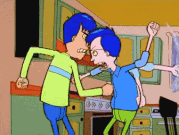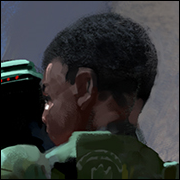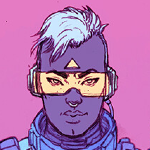|
Thanks for the link! I think I’ve seen it before (the method is very familiar) but I’d totally forgotten about it. I guess my only caveat is that I’m too dumb/inexperienced/incompetent to judge if a scene is doing all of the work that it should. I mean, is it okay to have scenes where characters just talk and maybe work out some character beats, but also scenes where they just give each other information? Like, I feel my ability to judge all of this in one pass is just not at that level yet.
|
|
|
|

|
| # ? May 21, 2024 17:51 |
|
Any time someone talks about critique, I immediately think of this Achewood strip:
|
|
|
|
newts posted:I mean, is it okay to have scenes where characters just talk and maybe work out some character beats, but also scenes where they just give each other information? Like, you're making art here, not creating a fuckin' algorithm or finessing a graduate essay. What's okay is "writing the story the best it needs" and what's not okay is "writing in a different way to what the story needs." If you're looking for explicit answers as to "how well did you achieve the thing" like, so I was just at a writing workshop, and it went really well for me. Multiple people with names! in the trad pub industry! (including s.l. huang! and jaymee goh!) loved what I brought. We went over, as part of the workshop, our first 3000 words of our manuscript, and the group I was in was super talented. I say this because I was also told, in quick succession:
What matters with your writing isn't "are you allowed to do thing/is thing the right way to do thing" but "are the choices you've made helpful towards what you wanted to achieve?" A full character talking, just sharing information, no actions scene can work great, or bad, or be an in between, and anybody who gives you an explicit answer without seeing the words themselves is just saying poo poo for their own ego. Hell, a bunch of people who do see the words will only be giving feedback based on their ego, not on what you were trying to achieve. A huuuuuuge part of getting better at this is learning to define your intents. Not to judge in one pass if you've answered everything you can, not to say if the techniques you used are the "right" ones--just to say "I wanted to do this here." You'll find the more you compare your poo poo to those thesis statements from that article (which I think is a bit blown out honestly, and a bit prescriptive, but it's useful) the better you get at working out if the stuff you've written can line up to them. If what you wrote doesn't line up with anything from your scene intent/book intent, and it won't at first, then you don't need to sit there and say "poo poo, how can I do this in one pass?" All you gotta do is ask "can this scene help with my book intent?" and if it can, start going slow through the scene to pick out places where you go off the track a bit too much. Do that, and you'll get better at picking the big picture poo poo up entirely by accident - but don't even bother trying to judge poo poo in one pass until you've got enough experience under your belt that you intrinsically stop asking questions that start with "is it okay to..." And even then, gently caress going for a one pass edit imo but that's just me and how I work~ Leng posted:I am probably overthinking all of this and it doesn't really matter. Does anyone have a view?
|
|
|
|
Hey everyone, I've been reading this thread on and off the past year or so for inspiration and am excited because I finally finished a draft! A hopefully fun scifi space adventure with framed fugitives trying to clear their name and stop a war, with robots, a talking cat, dinosaur aliens, bug aliens, space pirates, all the cool stuff. I haven't finished a story since high school over twenty years ago, I got partially written drafts all over the place, but decided I want to finish projects this year and getting a book finished was one of the big ones. I haven't been active here because I'm still at just page 39 of this thread (and I reread Dr. Kloctopussy's excellent posts on the first page multiple times), but will catch up quickly as now all my free time isn't typing up a draft. Will sit on it a month or three, already have multiple pages of revision notes just based on how things changed while I was writing it. Thanks for this awesome thread, I promise I won't be a stranger.
|
|
|
|
Coquito Ergo Sum posted:Have you checked to see if the phrase is inaccessibly Australian? ultrachrist posted:The only time I can think of engaging with Australian media and running into a completely foreign phrase was the repeated use of Sucked In! in Golf Story. SurreptitiousMuffin posted:If you're an ANZ writer I feel like this essay is pretty essential reading, and it's been weighing on me a lot too — there IS a path to having both and Gideon the Ninth threaded the needle, but it's a tricky space to navigate. Milkfred E. Moore posted:I'm Australian and write in American English. I do my utmost to remove any and all Australianisms and slang from characters who are not Australian. But I think there's something in my Australian perspective that gets people to say my manuscript has "a surreal sense of humor" which, now that I've read that essay that SurreptitiousMuffin posted, I think I'm finally understanding why Americans have that thought. Wungus posted:A million Americans are gonna write poo poo that feels more American than I ever will, which is why today I included the terms "have a chunder," "she'll be right," "fair dink," and "you mob" in my writing today on this relatively serious secondary world fantasy novel and yoooo it feels nice to lean the hell into Australiana. That said, as was pointed out earlier, and in that piece, doing this will definitely, intentionally create a wall for certain people outside of ANZ. It's just a fight I wanna have, and if you don't wanna have that fight, it's easy enough to avoid. That wall is what I'm really worried about. I'm seriously debating rewriting that entire verse just to get rid of the spelling difference. I have to do some rewrites of that stanza anyway, because the transition from one part of the verse to the next is a little awkward. a friendly penguin posted:Anomalous Blowout shared this method for revision at some point and it's the one I'm following right now: https://hollylisle.com/one-pass-manuscript-revision-from-first-draft-to-last-in-one-cycle/ The thing about revisions that makes my head explode is every time I identify an issue and a potential fix, it spawns ten other questions that cascade through the rest of the manuscript. Trying to hold all those questions in my mind to make a decision on what the revisions scope is the killer. I can't imagine trying to write all of those down on one printed copy of a manuscript would result in anything coherent, but I guess it wouldn't hurt try that. Tars Tarkas posted:Hey everyone, I've been reading this thread on and off the past year or so for inspiration and am excited because I finally finished a draft! A hopefully fun scifi space adventure with framed fugitives trying to clear their name and stop a war, with robots, a talking cat, dinosaur aliens, bug aliens, space pirates, all the cool stuff. Congrats on finishing! That's a huge achievement. Sounds like a fun book—I am very much here for the talking cat and space pirates.
|
|
|
|
Leng posted:The thing about revisions that makes my head explode is every time I identify an issue and a potential fix, it spawns ten other questions that cascade through the rest of the manuscript. Trying to hold all those questions in my mind to make a decision on what the revisions scope is the killer. I can't imagine trying to write all of those down on one printed copy of a manuscript would result in anything coherent, but I guess it wouldn't hurt try that. I'm currently editing a bunch, and I just keep all of my scenes/chapters/etc well organized in Scrivener (with extra labels for secondary characters and poo poo like that) so I can easily put notes on exactly the scenes I need them for and go from there. I do everything I can to avoid having to reference external documents while editing. If I ran into changes so sweeping that that wasn't suitable (entire scenes need to be cut or rewritten/new ones added) that means I hosed up repeatedly during drafting. Of course if you're going by the seat of your pants that process is kind of reversed.
|
|
|
|
Leng posted:That wall is what I'm really worried about. I'm seriously debating rewriting that entire verse just to get rid of the spelling difference. I have to do some rewrites of that stanza anyway, because the transition from one part of the verse to the next is a little awkward.
|
|
|
|
George Saunders started a substack a few months ago called Story Club: https://georgesaunders.substack.com/ I've just started reading it but it's basically a continuous online version of what he does in his book, A Swim in the Pond in the Rain, which was excellent. I'm not even a huge fan of his fiction but he seems like an amazing teacher. Especially in his way to state things I kind of already knew but never articulated out loud. Like the way describing a character creates plot.
|
|
|
|
Wungus posted:A million Americans are gonna write poo poo that feels more American than I ever will, which is why today I included the terms "have a chunder," "she'll be right," "fair dink," and "you mob" in my writing today on this relatively serious secondary world fantasy novel and yoooo it feels nice to lean the hell into Australiana. That said, as was pointed out earlier, and in that piece, doing this will definitely, intentionally create a wall for certain people outside of ANZ. It's just a fight I wanna have, and if you don't wanna have that fight, it's easy enough to avoid. I asked in a local writers discord and opinions were split. Some get reviews saying there are typos in their work. Some say no one is bothered. Some say it’s only a problem if you have Canadian spelling in the title. Some only write true CanLit, about Canadian people and places, so the subject matter and the way it’s written align. I think there’s something sad about limiting your expression to suit someone else’s expectations. I’m not writing to make money (although that would be nice), so the choice for me is really easy - definitely publishing in Canadian English, hobbyist’s choice. But it’s not as simple when you’re thinking about it from a market perspective. There’s no way to predict what people will feel is impenetrable vs what they’ll view as interesting and unique. Leng posted:"Sucked in" is so intuitive though...even if you've never heard it before you know exactly what it means. Tars Tarkas posted:Hey everyone, I've been reading this thread on and off the past year or so for inspiration and am excited because I finally finished a draft!
|
|
|
|
Wungus posted:A million Americans are gonna write poo poo that feels more American than I ever will, which is why today I included the terms "have a chunder," "she'll be right," "fair dink," and "you mob" in my writing today on this relatively serious secondary world fantasy novel and yoooo it feels nice to lean the hell into Australiana. That said, as was pointed out earlier, and in that piece, doing this will definitely, intentionally create a wall for certain people outside of ANZ. It's just a fight I wanna have, and if you don't wanna have that fight, it's easy enough to avoid. gently caress yeah mate. Gonna put some more currawongs in my fantasy novel right now.
|
|
|
SurreptitiousMuffin posted:I mean, if it helps, Gideon has shaken things the gently caress up and the Yanks are actively looking for ANZ Voice right now. I cut most of it from the MS I was shopping around, then after it got picked up my US agent/editor both encouraged me to add it back in. I don't know how long that window is gonna be open, but I'm doing my damndest to make it permanent. It'd be neat if you could PM me any of these people who are looking for ANZ stuff. I'm from Australia and being Australian has only been a bit of an obstacle in my querying experience!
|
|
|
|
|
 What book is this from? This seems like great advice but I wanna see what comes after it. And before it, too.
|
|
|
|
Story, by Robert McKee, at a guess
|
|
|
|
sebmojo posted:Story, by Robert McKee, at a guess Just checked my copy, you're spot on.
|
|
|
|
Junpei posted:
I kind of disagree with this. Holding secrets close to your chest more often makes the story coy and twist-driven. In the example given--what's more interesting? A story where we learn about a character's childhood trauma and then see them deal with that? Or a story where a character acts weirdly and only at the end do we find out why? Obviously you need to parcel out exposition as a matter of practicality (people can't read more than one sentence at a time, so something has to come first). But the overemphasis on blindsiding the audience is what leads to crap like the last season of Game of Thrones. (I could be misinterpreting the book though since I'm only seeing that one page.)
|
|
|
|
My interpretation is that you don’t keep it THAT close to the chest where it’s a shocker but dole it out in a slow way.
|
|
|
|
Sailor Viy posted:I kind of disagree with this. Holding secrets close to your chest more often makes the story coy and twist-driven. In the example given--what's more interesting? A story where we learn about a character's childhood trauma and then see them deal with that? Or a story where a character acts weirdly and only at the end do we find out why? Here's a little more of the context: Story by Robert McKee posted:A certain breed of West Coaster carries around prepared deep dark secrets to share with one another at cocktail parties to validate themselves one to the other as authentic Californians—“centered” and “in touch with their inner beings.” When I’m standing over the tortilla dip at such parties and somebody tells me about dog poo poo in his Keds as a child, my thought is: “Wow! If that’s the prepared deep dark secret he tells people over the guacamole, what’s the real stuff?” With the additional clarification of what type of secrets he's talking about, I see what he means. Basically, he's saying 'don't reveal a secret until the story can't hold it in any longer,' which is actually pretty open-ended advice. In your example, a story about someone dealing with trauma, the secret MUST come out early since the plot unfolds from it. In an example like Chinatown, the story is about duplicity (in part), so there have to be secrets all the way until the end. When you put explosive information really depends on the type of story you're trying to tell, and the tone and themes you want to hit.
|
|
|
|
The thing you need to keep in mind with secrets and mysteries is that information that motivates the viewpoint characters should not be kept secret from the audience. If we don't know why the viewpoint characters do what they do, we don't understand the stakes, and if we don't understand the stakes, we can't care about them. The viewpoint character may not reveal that their mom is the evil overlord in regular smalltalk, but they should at least be thinking about it while making their plans and executing their goals. If you really want to save secrets in a viewpoint character's backstory for a big dramatic reveal, the secrets should be hidden from the viewpoint character. Maybe they're like Luke and their guardian(s) kept information about their parentage or early childhood from them. Maybe they forgot the secrets because they have amnesia. Maybe both! Then when the secret comes out, you get to play up the character's shock. Probably the only exception to the "don't keep motivating secrets secret" rule is when your character(s) is/are executing a hidden plan; e.g. in a heist. Even then, you should have a character make noises about having a plan, then cut away before they explain that plan. Then the audience at least knows to expect the character to pull a solution out of their rear end. Still, hidden plan narratives play out better in film -- where we can only guess at characters' hidden motives based on dialogue, facial expressions, gestures, musical cues, etc. -- than in prose where we get to see a viewpoint character's every thought and observation on the page.
|
|
|
|
Leng posted:Congrats on finishing! That's a huge achievement. Sounds like a fun book—I am very much here for the talking cat and space pirates. kaom posted:This is amazing, congrats! The last time I wrote long form fiction was high school over 20 years ago but I was doing a ton then, lost passion in college but have kept up a movie blog for over 17 years. It was cool rereading the pages when it looked like the site was dead as every long-standing thread had something similar (even the who greenlit thread I run lol) And I'll probably start doing Thunderdome before April ends to get more creative practice, reading through that now and might do some practice stories based on old prompts if I can get the kid asleep before 11
|
|
|
|
How much of yourself do you put into your characters? I know some people who are like "Here's the one character that's basically me", and others who are like "Okay, he's my drama club goth days, and she's my desperate need for approval from authority figures, and she's my snarky bookworm tendencies, and he's who I wish I was more like" etc etc.
|
|
|
|
For me that falls under the same category of writer automythology as 'the characters talk to me'. I believe it's true for some writers, but it's bemusing.
|
|
|
|
Junpei posted:How much of yourself do you put into your characters? I know some people who are like "Here's the one character that's basically me", and others who are like "Okay, he's my drama club goth days, and she's my desperate need for approval from authority figures, and she's my snarky bookworm tendencies, and he's who I wish I was more like" etc etc. I think certain aspects of myself goes into my characters. More broad brush aspects rather then the specifics in your examples. I only find out after the piece is done though. In a downside, my regionality and biases reflect in my writing/characters, something I've been trying to address.
|
|
|
|
DropTheAnvil posted:I think certain aspects of myself goes into my characters. More broad brush aspects rather then the specifics in your examples. I only find out after the piece is done though. It’s more like I pick some key background elements (education, culture, etc.) and their beliefs and goals, then figure out what makes sense to me from there. Like if someone’s goal is “get a promotion” I have to decide what’s motivating that and might come up with a few possibilités. Maybe they’re broke and desperate. Maybe they’re insecure and want to impress people. Maybe they completely deserve the promotion, but keep being unfairly overlooked. Those things, and the type of story I end up telling, are all so interlinked that I’d find it hard to tease apart the thought process. I’ve also given characters personality adjustments before when I realized something wasn’t working in the story. The kind of traits they inherit from me tend to be dumb things like “likes animals” - because I want to write about cool animal facts and no one can stop me, it’s going in!
|
|
|
|
It's a weird question to answer because there's a lot of different things "how much of yourself you put into your characters" can mean. Every character I write comes from my brain, so every thought they have is one that I had of them thinking it. In that sense my characters are wholly 'me'. On the other hand, I have written very few stories with characters meant to be a direct cipher for my identity, and generally only when it won't be obvious. Int hat sense, I put very little of me into my characters. And if it's about how much of my values, perspectives, and interests make it into the characters, a fair chunk (though not a majority) draw directly from some aspect of my psyche. It's the kind of introspection writers enjoy because to answer it you get to talk about your process and your characters, but I don't know how useful it is when thinking about writing for an audience. It means a lot to the author, but the readers aren't going ot know that.
|
|
|
|
I feel like a lot of that is incidental: I’m more confident and better able to write in detail about things I know, so my characters have attributes that are things I know. But, I mean, same thing for my settings  Also, most of my main characters are bi because I’m bi and I like reading about bi people, but that’s really the only bit of myself I add that’s not related specifically to ease of writing. Also, lots of people are bi, so why not?
|
|
|
|
It's probably easier to write believable characters that are similar to ourselves, but that doesn't interest me as a writer or as a reader. If I want to write characters that are well-realized I'll never be able to entirely separate them from my own perspective and experience, but I'm usually working to stretch the gap I can work in as far as I can.
|
|
|
|
Wild advice I saw: Scan your doc for usages of these words that are in front of adjectives: “rather”, “quite”, “somewhat”, “nearly” or “almost”. Then ask "Does that really need to be there? Or am I just trying to avoid making a definitive statement?" If it's the latter, you can probably cut it, leaving the adjective by itself.
|
|
|
|
Yeah I guess those would fall under generally being passive? I know I sort of do those absolutely all the time.
|
|
|
|
Add “just” and “simply”. And check every time you say something “felt like” or “seemed like” instead of just was. It may seem minor but has improved my writing greatly.
|
|
|
|
I’ve been removing a lot of “seemed like” instances. I was trying to make the narrator look appropriately uncertain, but decided there are better ways of indicating that because it really cluttered up the prose! Similar improvements being made: - Removing adverbs by choosing more descriptive verbs in the first place. - Removing as many “I thought” and “I realized” and “I saw” -style filter words as possible.
|
|
|
|
idk seemed and its equivalents are really useful if you basically need to hard tell another characters emotion to the reader in limited 3rd. nothing wrong with a good seemed.
|
|
|
|
A good rule is to remove words like that and see if it changes the meaning of the sentence, if it does maybe put it back. Mostly it won't. The goal is conscious writing, rather than everyone sounding like hemingway imo
|
|
|
|
Some kind of a Star Trek scriptwriting quirk
|
|
|
|
Seemed is like tried, I think, where it feels like you'll have a better sentence if you tried (heh) to eliminate it. 'He seemed angry.' Well, why did he seem angry? 'She tried to reach the book.' Well, how did she try to reach the book? There's certain words that are there for dialogue, really, and you should try to cut down in prose. To borrow kaom's example, sometimes when I read those words in a story I don't think the narrator/character is uncertain so much that I think the author didn't know how to describe something and figured they could off-load it to the reader.
|
|
|
|
|
Milkfred E. Moore posted:Seemed is like tried, I think, where it feels like you'll have a better sentence if you tried (heh) to eliminate it. 'He seemed angry.' Well, why did he seem angry? 'She tried to reach the book.' Well, how did she try to reach the book? My issue with "X seemed angry" (which I'll end up writing anyway and then removing or changing in editing because I'm a bad person) is that the psychic distance is almost always disjointed. If we're not tight on the PoV then who is it that they seem angry to? The reader? If we are tight it's implying an uncertainty that's usually unjustified; I might think "Nancy's pissed," or "gently caress, I shouldn't have said that" but I rarely find myself unsure about such basic facets of a person's emotional state. If the uncertainty is justified then why deliver the tepid conclusion instead of the speculation it hints at? On the other hand "tried" usually just feels like lazy word choice 
|
|
|
|
Probably should add "vaguely" to that list of words to cut.
|
|
|
|
The main issue with saying characters "saw" or "felt" something is that it's redundant and creates a sense of narrative distance, often to no good purpose. Consider "She saw Miguel was trembling" vs. "Miguel was trembling." We still understand that the viewpoint character is noticing what Miguel is doing in the second example, but we feel it more immediately. It's almost like we are there with her, experiencing what she's experiencing at the exact moment she does.
|
|
|
|
the word "quite" should never Pththya-lyi posted:The main issue with saying characters "saw" or "felt" something is that it's redundant and creates a sense of narrative distance, often to no good purpose. Consider "She saw Miguel was trembling" vs. "Miguel was trembling." We still understand that the viewpoint character is noticing what Miguel is doing in the second example, but we feel it more immediately. It's almost like we are there with her, experiencing what she's experiencing at the exact moment she does. even better: "Miguel trembled."
|
|
|
|
Even different forms of the same verb change meaning when you're changing tense around. Shivered is past tense, shivering is progressive. "He stepped into the room and shivered" is not quite the same as "He stepped into the room, shivering." The first one is a single action, not an ongoing action. There's more complicated rules about habitual tenses and differences between dialects of English on how you refer to what. That's why I like the "take it out and see if it makes it stronger" approach. It's not that you have to strike out everything superfluous, it's that you should be conscious of the choices you make. Some books use nonstandard formatting for quotes. It would be easier to read them if they didn't. Maybe the whole point is to make it harder to read. Ursula K Le Guin has a good bit on her book on writing where she says you should ignore any of her advice if it would make your story worse. (I think she specifically says "less beautiful" but it's in a context where she's using 'beauty' in the sense of the essential uniqueness of a writer's creative output, not beauty in the sense of florid prose.)
|
|
|
|

|
| # ? May 21, 2024 17:51 |
|
Fate Accomplice posted:the word "quite" should never Quite.
|
|
|





























